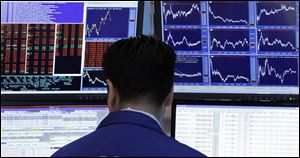
Stocks extend slide to a fifth day as investors digest disappointing U.S. economic news
4/10/2012
A specialist works at his post on the floor of the New York Stock Exchange.
NEW YORK — The stock market extended its longest and deepest slump of the year Tuesday, caught between a recurring nightmare of European debt and the beginning of uncertain corporate earnings reports at home.
The Dow Jones industrial average fell almost 200 points and was on pace for its third triple-digit decline in four trading sessions. It hit its lowest point since mid-February, during the market's strong and steady climb earlier this year.
The losses hit large and small companies alike, and both industries that perform well in good times and stocks that are seen as safe investments in bad times.
European markets sold off while Wall Street was still sleeping. Concern about the financial health of Spain intensified, and borrowing costs for that country rose considerably.
The main stock indexes in Spain and France closed down about 3 percent for the day, the equivalent of a 400-point drop in the Dow. Stocks dropped 2.5 percent in Germany and 2.2 percent in Britain.
"They've managed to put a Band-Aid on the debt crisis, but there's really no solution," said Colleen Supran, a principal at the investment adviser Bingham, Osborn & Scarborough. "And Spain is a much bigger problem than Greece."
Spain makes up about 11 percent of the economic output of the 17 countries that use the euro currency. Greece makes up only 2 percent.
In the United States, investors waited for an earnings report from Alcoa, the aluminum maker, scheduled for just after the closing bell. Alcoa is the first of the 30 stocks in the Dow to report its quarterly results.
After nine consecutive quarters of earnings growth, analysts think earnings will decline 0.1 percent this time. Better performance than that could stop the market's decline, but a weaker showing could accelerate the selling.
The economic news of the day was mixed: Wholesale businesses increased their inventories in February more than analysts had expected, and more expensive gasoline drove sales higher.
The growth of wholesale restocking is still expected to be a drag on the overall economy for the first quarter, but not as much as economists thought.
Still, after the strongest first three months for stocks since 1998, investors have found plenty to fret about: The Federal Reserve is worried about the strength of job growth and not inclined to provide further help for the economy.
The Dow declined 335 points from last Tuesday through Monday. That included 131 points on Monday, the first time investors could react to a report showing much weaker job gtowth in March than in the three previous months.
At 2 p.m. Tuesday, the Dow was down 177 points at 12,752. The S&P was down 19 points at 1,363. The Nasdaq composite index, which eked out a gain in one of the past four days thanks to outsized contributions from Apple, was down 45 points at 3,002.
Consumer discretionary stocks, which include travel companies, clothing stores and cable companies, fell 2 percent as group, the worst-performing segment of the market.
Financial stocks fell almost as much, and even utilities and health care stocks, which are more dependable in times of economic uncertainty, were down more than 1 percent each.
The worst-performing stock in the Dow was Bank of America, which tends to take a hit when concerns about Europe grow stronger. Bank of America was down 3.8 percent.